
Zhiguli passion in Spain
/ Главная / Russkiy Mir Foundation / Publications / Zhiguli passion in SpainZhiguli passion in Spain
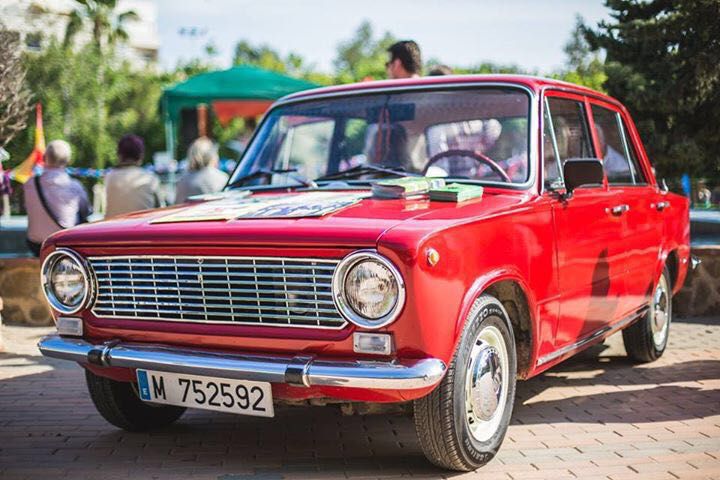
Photo courtesy of Alexey Shishkov
Saratov-born Alexey Shishkov, a dental technician from Torrevieja, Spain, could drive to work in a different Zhiguli every day of the week if he wanted to. On Monday, he could choose his beige VAZ-2101 or "Kopeyka" and end the weekend in a red VAZ-2105 or Lada. His collection includes all Zhiguli models, as well as Niva and UAZ. The entire car fleet was purchased from Spanish owners.
Alexey Shishkov's collection of Soviet cars is probably the largest in Spain. He uses it to drive all over the city and the country delighting both locals and tourists. Furthermore, the cars from his collection win retro competitions, receive hundreds of thousands of views on YouTube, and capture the attention of the local traffic police. Yet, the officers stop Alexey not to fine him but rather say, "My grandfather had one just like it."
Saratov UAZ and Spanish Niva
His passion for cars was inspired by his grandfather. Since his early years, back in Saratov, Alexey spent a lot of time together with his grandfather fiddling under the bonnet of a Moskvich and then a UAZ. Later on, having moved to Spain, the grateful grandson helped his grandfather to assemble a replica of his favorite car. A few years ago his grandfather passed away. Alexey made sure that the old UAZ would not be rotting in the garage. It can be seen in the streets, at exhibitions, and in the wedding corteges of Russian compatriots.
Read also: “Zhiguli” on avenues, “Volga” on streets
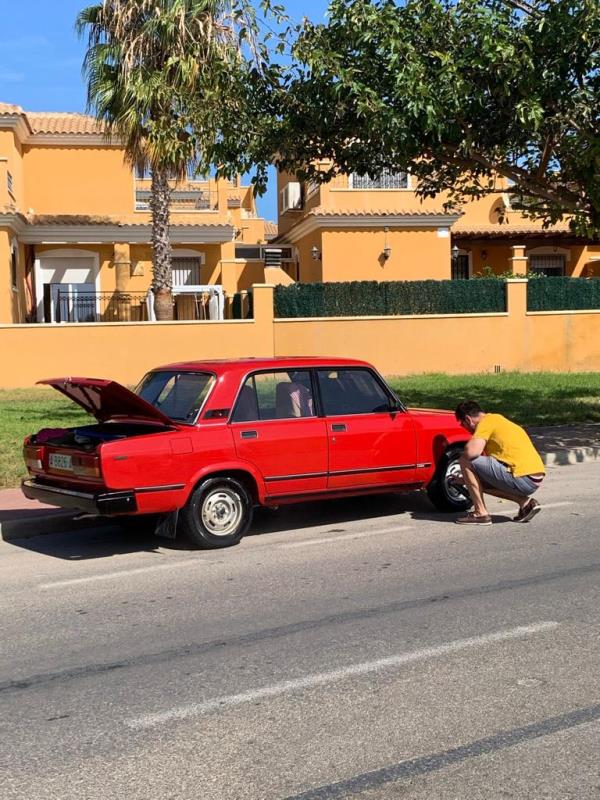
Photo courtesy of Alexey Shishkov
"Niva was my first Soviet car here," Alexey told Russkiy Mir. "I found it in a disposal dump near the city where I live about eight or nine years ago. I felt pity for it and decided to take it. I found out that it was still up and running, and the engine was fine. That Niva was a convertible, that is a rare version. My grandfather and I brought it in, restored it, and I still have it.”
That Niva from the disposal dump marked the start of the biggest passion in Alexey's life, which is finding and restoring products from the Soviet car industry. The first car was followed by the second one, then the third, fifth, and tenth. Alexey Shishkov's collection at its height included 17 Zhiguli cars (all models), as well as several Ural and IZh motorcycles. However, some of the wheeled showpieces had to be sold.
The extensive collection is a burden. One of the concerns is where to keep the cars. Furthermore, all of Alexey's cars are up and running, thus, requiring registrations and insurance. Currently, the Saratov man's collection is mostly spread across his friends' garages. "I sold some of my cars to my compatriot friends, and the Zhiguli Owners Club was formed in Torrevieja," he said.
Alexey brings in spare parts required for the restoration from Russia or sources them from local vehicle owners. Besides, he managed to find a warehouse of a Lada brand store that had survived in Spain since the Perestroika era. By the way, there used to be a lot of such stores in the country. One thing he has no issues with is tires as Zhiguli can be fitted with tires from Spanish cars.
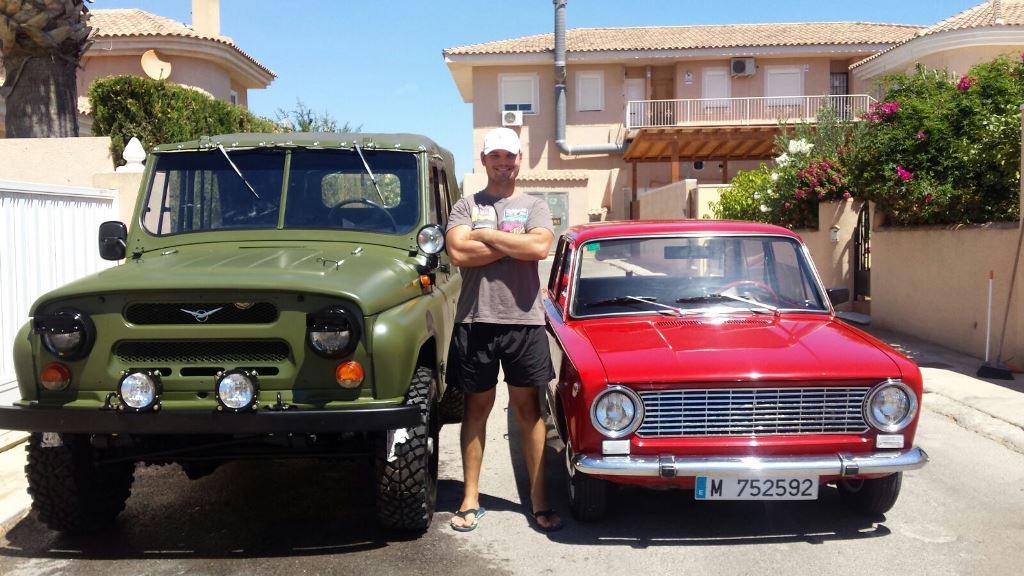
Photo courtesy of Alexey Shishkov
"My friends in Bilbao have founded a Soviet vehicle club," Alexey says. "All of the club's members are Spaniards who are fond of our cars. They hold conventions, and I sometimes visit them. It's kind of a long way, about 800 kilometers, still, the Zhiguli endure.”
Some stories about him searching for and restoring Soviet cars can be found on YouTube. A substantial part of the videos features mere driving in Zhiguli along narrow Spanish streets. This mesmerizing scenery attracts the attention of tens and even hundreds of thousands of people. His video under the title "Found a VAZ from the USSR in Spain" has generated more than 860,000 hits.
Circular and square headlamps
Alexey has gathered his collection by searching "through garages and disposal dumps," looking for references to Soviet cars in advertisements, and getting to know many collectors from different Spanish cities. "I was mainly buying cars that the owners or their descendants had no need for," he says. "At one time, in the 1980s, the USSR was actively exporting Zhiguli to Spain. Back then these vehicles were much needed and in high demand. However, the years go by, and trends change."
Alexey Shishkov found the dream of Soviet and Russian car enthusiasts, VAZ-2109, in a cowshed. “The Spaniards drove it for 30,000 kilometers (18,600 miles), put it in that cowshed, and didn't even think about it for years," he says. "When it was taken out and washed clean, it turned out to be a nearly brand-new, great car with original tires. It did not even need a restoration, and I got it for 700 euros only. That was the way. Some cars I brought from other cities and bought them very cheap. Some cars were given to me as gifts."
Alexey emphasized that his collection was not intended for traveling to work or to the supermarket, nor was it for business purposes. He has no intentions of opening a car rental for tourists or making money from his passion otherwise. Nevertheless, he sometimes lends his cars to exhibitions and weddings of Russian compatriots for the sake of taking beautiful photos.

Photo courtesy of Alexey Shishkov
"I drove Zhiguli on a daily basis during a certain period of my life because there were no other cars," he says. "I used to drive VAZ-2107, while my girlfriend drove VAZ-2106. We often took the road together surprising everyone. We were always welcomed with enthusiasm by both the Spaniards and the Soviet natives. The Soviet car industry is treated with great respect here, and the older generation remembers all the models very well.”
According to Alexey, he has never faced mockery, only genuine interest, including from the local police. After checking the documents, the traffic police officers often recall their childhood memories when their parents and grandparents used to drive Zhiguli, Lada, and Niva. "They take out pictures of their grandparents' cars and try to compare which car has rounder or boxier headlights," laughed the collector.
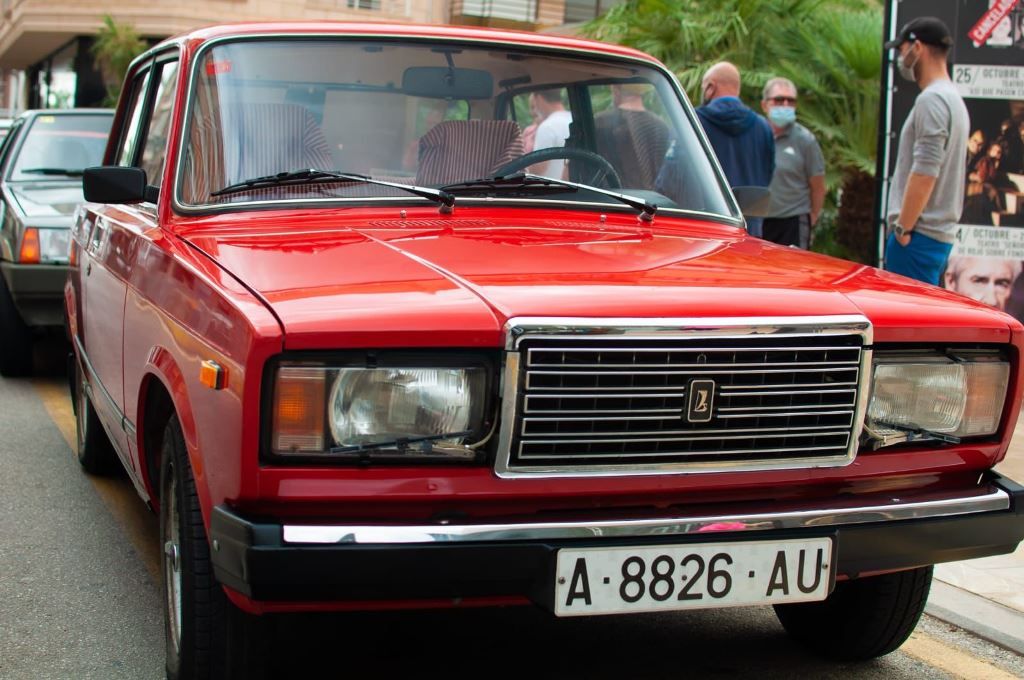
Photo courtesy of Alexey Shishkov
According to him, the anti-Russian hysteria of these recent months has not affected him or his vehicles. There have been no attacks or insults. Alexey said that Torrevieja was a fairly small city, and the residents knew each other quite well.
Love for things from the Soviet era
Alexey Shishkov moved to Spain as a teenager more than 20 years ago. One would think that the young man from Saratov could be fascinated by the sea, the mountains, and the resort city with 320 days of sunshine a year for a long time. However, according to Alexey, the new country made him realize how much he loved Soviet-era items, and he started getting them.
As the years went by, he realized that his collection was not about buying cars and other antique items made in the Soviet Union but rather about artifacts of Soviet exports to Spain. Today his collection includes dozens of items that represent the history of Moscow's trade with Europe in different eras.
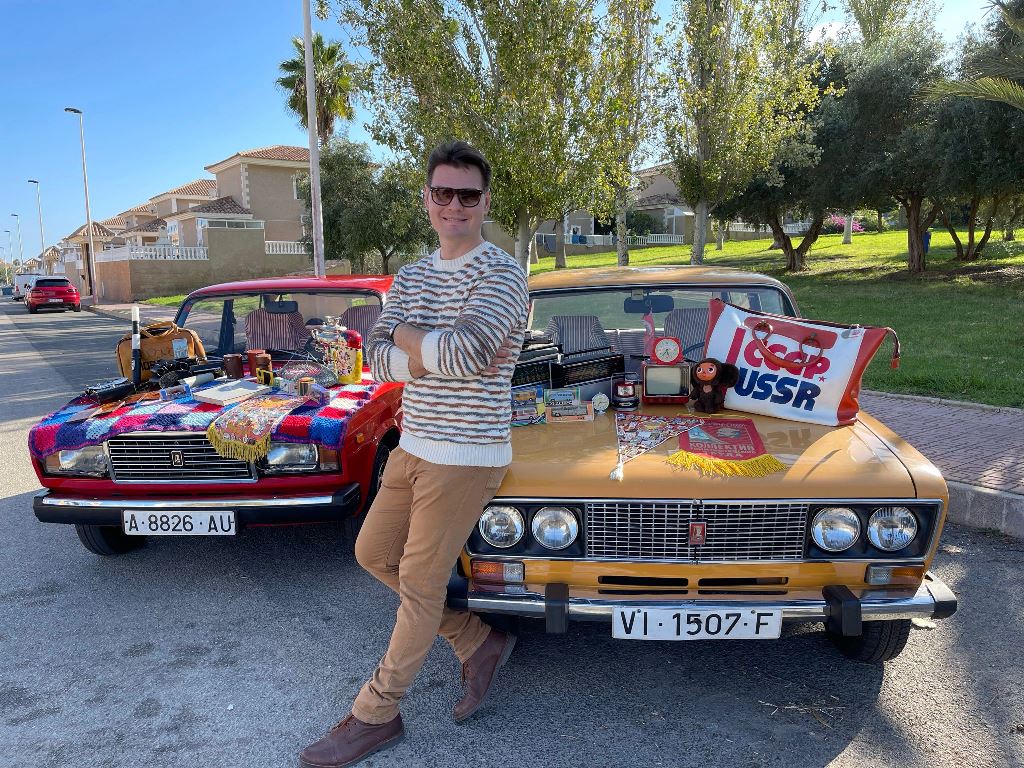
Photo courtesy of Alexey Shishkov
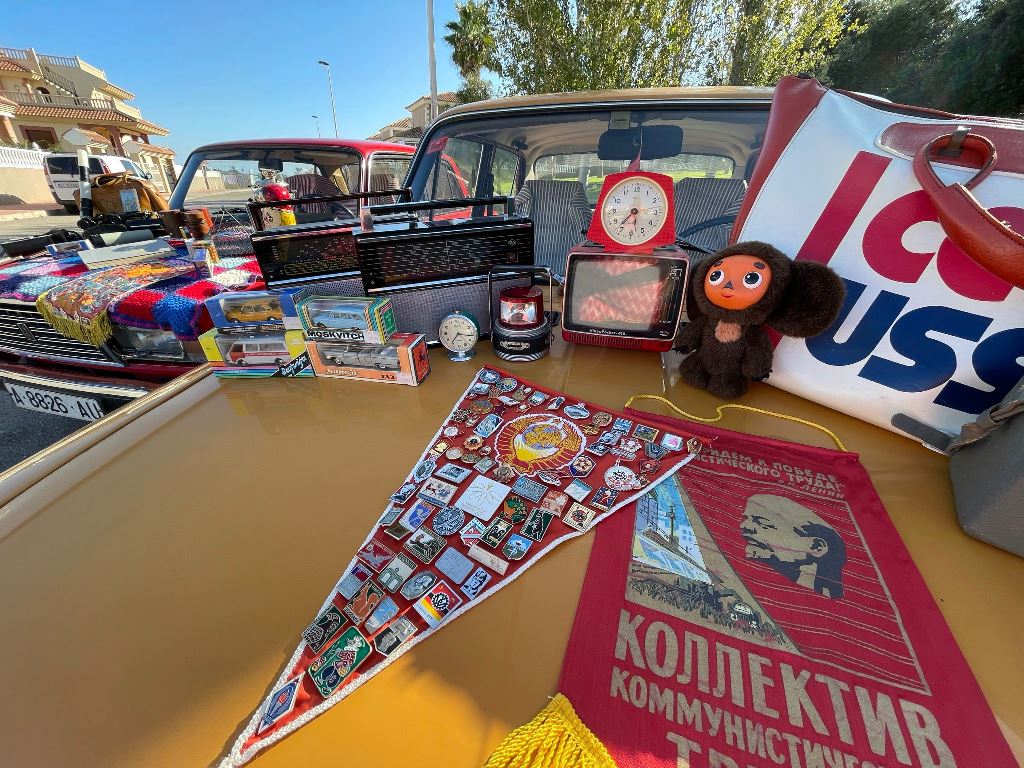
Photo courtesy of Alexey Shishkov
Here are several types of broadcasting receivers and cameras, as well as binoculars, bags with Olympic rings, badges, pennants, alarm clocks, microscopes, Matryoshka dolls, and other toys (the plush Cheburashka has not faded under the Spanish climate over the decades) and many more. The crown jewel of the collection is a Soviet Molot gramophone. It was made during the Stalin era and brought to Spain by the war children rescued by the Soviet Union.
"This is my life, and I like it," said Alexey. "Now I'll manage Zhiguli and see what other vehicles I can collect, for instance, Volgas and other brands, or Soviet tractors and combine harvesters. I've seen them in the fields of Spain too.”
New publications

 Mikhail Kalatozov, a director who transformed the world of cinematography in many ways, was born 120 years ago. He was a Soviet film official and a propagandist. Above all, he was capable of producing movies that struck viewers with their power and poetic language.
Mikhail Kalatozov, a director who transformed the world of cinematography in many ways, was born 120 years ago. He was a Soviet film official and a propagandist. Above all, he was capable of producing movies that struck viewers with their power and poetic language.  Ukrainian authorities have launched a persecution campaign against the canonical Ukrainian Orthodox Church (UOC), the biggest one in the country's modern history. Over the past year, state sanctions were imposed on clergy representatives, searches were conducted in churches, clergymen were arrested, criminal cases were initiated, the activity of the UOC was banned in various regions of the country, and monasteries and churches were seized.
Ukrainian authorities have launched a persecution campaign against the canonical Ukrainian Orthodox Church (UOC), the biggest one in the country's modern history. Over the past year, state sanctions were imposed on clergy representatives, searches were conducted in churches, clergymen were arrested, criminal cases were initiated, the activity of the UOC was banned in various regions of the country, and monasteries and churches were seized.  When Nektary Kotlyaroff, a fourth-generation Russian Australian and founder of the Russian Orthodox Choir in Sydney, first visited Russia, the first person he spoke to was a cab driver at the airport. Having heard that Nektariy's ancestors left Russia more than 100 years ago, the driver was astonished, "How come you haven't forgotten the Russian language?" Nektary Kotlyaroff repeated his answer in an interview with the Russkiy Mir. His affinity to the Orthodox Church (many of his ancestors and relatives were priests) and the traditions of a large Russian family brought from Russia helped him to preserve the Russian language.
When Nektary Kotlyaroff, a fourth-generation Russian Australian and founder of the Russian Orthodox Choir in Sydney, first visited Russia, the first person he spoke to was a cab driver at the airport. Having heard that Nektariy's ancestors left Russia more than 100 years ago, the driver was astonished, "How come you haven't forgotten the Russian language?" Nektary Kotlyaroff repeated his answer in an interview with the Russkiy Mir. His affinity to the Orthodox Church (many of his ancestors and relatives were priests) and the traditions of a large Russian family brought from Russia helped him to preserve the Russian language.

 The leaders of the Friends of the Great Russia cultural association (Amici Della Grande Russia) in Italy believe that the Western policy of abolishing Russian culture in Europe has finally failed. Furthermore, it was doomed to failure from the beginning.
The leaders of the Friends of the Great Russia cultural association (Amici Della Grande Russia) in Italy believe that the Western policy of abolishing Russian culture in Europe has finally failed. Furthermore, it was doomed to failure from the beginning.  Name of Vladimir Nemirovich-Danchenko is inscribed in the history of Russian theater along with Konstantin Stanislavski, the other founding father of the Moscow Art Theater. Nevertheless, Mr. Nemirovich-Danchenko was a renowned writer, playwright, and theater teacher even before their famous meeting in the Slavic Bazaar restaurant. Furthermore, it was Mr. Nemirovich-Danchenko who came up with the idea of establishing a new "people's" theater believing that the theater could become a "department of public education."
Name of Vladimir Nemirovich-Danchenko is inscribed in the history of Russian theater along with Konstantin Stanislavski, the other founding father of the Moscow Art Theater. Nevertheless, Mr. Nemirovich-Danchenko was a renowned writer, playwright, and theater teacher even before their famous meeting in the Slavic Bazaar restaurant. Furthermore, it was Mr. Nemirovich-Danchenko who came up with the idea of establishing a new "people's" theater believing that the theater could become a "department of public education."  "Russia is a thing of which the intellect cannot conceive..." by Fyodor Tyutchev are famous among Russians at least. December marks the 220th anniversary of the poet's birth. Yet, he never considered poetry to be his life's mission and was preoccupied with matters of a global scale. Mr.Tyutchev fought his war focusing on relations between Russia and the West, the origins of mutual misunderstanding, and the origins of Russophobia. When you read his works today, it feels as though he saw things coming in a crystal ball...
"Russia is a thing of which the intellect cannot conceive..." by Fyodor Tyutchev are famous among Russians at least. December marks the 220th anniversary of the poet's birth. Yet, he never considered poetry to be his life's mission and was preoccupied with matters of a global scale. Mr.Tyutchev fought his war focusing on relations between Russia and the West, the origins of mutual misunderstanding, and the origins of Russophobia. When you read his works today, it feels as though he saw things coming in a crystal ball...